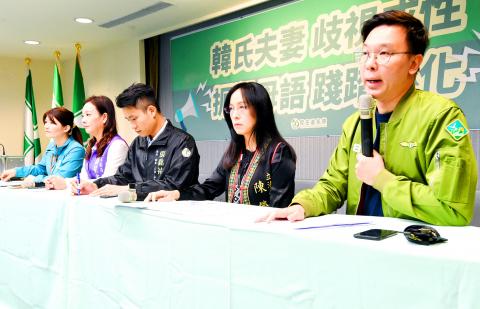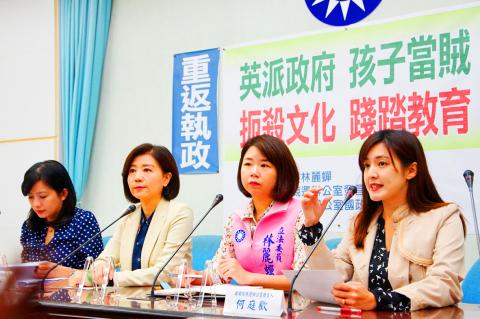The Democratic Progressive Party (DPP) and the Chinese Nationalist Party (KMT) yesterday sparred over comments by Kaohsiung Mayor Han Kuo-yu’s (韓國瑜) wife, Lee Chia-fen (李佳芬), that studying mother tongues in school is a waste of resources.
Hoklo (commonly known as Taiwanese) “is what I speak at home. Why then is it still studied at school?” Lee said on Sunday, adding that the Ministry of Education’s efforts to promote the language are a waste of time and resources.
Her comments echoed remarks last year by Han, the KMT’s presidential candidate, that it was a “waste of time” to include native-language classes in the 12-year national education program.

Photo: Chu Pei-hsiung, Taipei Times
The DPP yesterday criticized Lee and Han, saying that they were discriminating against mother tongues.
Han should not place the teaching of native and foreign languages on opposite sides, as learning both would not conflict with each other, DPP Deputy Secretary-General Lin Fei-fan (林飛帆) told a news conference.
DPP Legislator Chen Ying (陳瑩), a Puyuma, said that Taiwan is a nation of diverse cultures and ethnicities, but added that her mother tongue, as well as those of others, is endangered because of the former KMT authoritarian regime’s policy of banning “local dialects” in public.

Photo: CNA
Chen said that her efforts to promote the Aboriginal Language Development Act (原住民族語言發展法) aim to rectify the damage of past government policies.
DPP Legislator Chiang Chieh-an (蔣絜安), a Hakka, called on Han and Lee to stop viewing issues from a “colonial government” vantage point, saying that teaching native and foreign languages at school would preserve Taiwan’s unique diversity of ethnicities and maintain a well-rounded worldview.
Lee should not “worship foreign things” simply because she runs Victoria Academy, a bilingual school in Yunlin County, Chiang said, adding that local and foreign languages are equally important.
Shortly after the DPP’s news conference, Han’s campaign held its own to hit back against the DPP’s criticism, with Han’s campaign office spokeswoman Ho Ting-huan (何庭歡) saying that Han has never said that native-language education is not important, or that it should be banned.
Lee’s comments only highlighted that fragmented learning of a native language at school would inhibit educational efficacy, while learning a language at home is more effective, Ho said.
The foreign-language capabilities of Taiwanese students have for decades lagged behind those of students in Hong Kong and the Philippines, Ho said, adding that future generations will be at a severe disadvantage.
Learning English should be the focus in school, in addition to promoting clubs, activities and a household environment conducive to the learning of mother tongues, she said.
The Han campaign is against radical ideology, discrimination, increased divisiveness between ethnic groups and slander, she added.
Han and Lee have offered more choices for language learning policies, an area in which the Ministry of Education has sadly been lacking since the DPP took power in 2016, Ho said.

SECURITY: As China is ‘reshaping’ Hong Kong’s population, Taiwan must raise the eligibility threshold for applications from Hong Kongers, Chiu Chui-cheng said When Hong Kong and Macau citizens apply for residency in Taiwan, it would be under a new category that includes a “national security observation period,” Mainland Affairs Council (MAC) Minister Chiu Chui-cheng (邱垂正) said yesterday. President William Lai (賴清德) on March 13 announced 17 strategies to counter China’s aggression toward Taiwan, including incorporating national security considerations into the review process for residency applications from Hong Kong and Macau citizens. The situation in Hong Kong is constantly changing, Chiu said to media yesterday on the sidelines of the Taipei Technology Run hosted by the Taipei Neihu Technology Park Development Association. With

CARROT AND STICK: While unrelenting in its military threats, China attracted nearly 40,000 Taiwanese to over 400 business events last year Nearly 40,000 Taiwanese last year joined industry events in China, such as conferences and trade fairs, supported by the Chinese government, a study showed yesterday, as Beijing ramps up a charm offensive toward Taipei alongside military pressure. China has long taken a carrot-and-stick approach to Taiwan, threatening it with the prospect of military action while reaching out to those it believes are amenable to Beijing’s point of view. Taiwanese security officials are wary of what they see as Beijing’s influence campaigns to sway public opinion after Taipei and Beijing gradually resumed travel links halted by the COVID-19 pandemic, but the scale of

A US Marine Corps regiment equipped with Naval Strike Missiles (NSM) is set to participate in the upcoming Balikatan 25 exercise in the Luzon Strait, marking the system’s first-ever deployment in the Philippines. US and Philippine officials have separately confirmed that the Navy Marine Expeditionary Ship Interdiction System (NMESIS) — the mobile launch platform for the Naval Strike Missile — would take part in the joint exercise. The missiles are being deployed to “a strategic first island chain chokepoint” in the waters between Taiwan proper and the Philippines, US-based Naval News reported. “The Luzon Strait and Bashi Channel represent a critical access

Pope Francis is be laid to rest on Saturday after lying in state for three days in St Peter’s Basilica, where the faithful are expected to flock to pay their respects to history’s first Latin American pontiff. The cardinals met yesterday in the Vatican’s synod hall to chart the next steps before a conclave begins to choose Francis’ successor, as condolences poured in from around the world. According to current norms, the conclave must begin between May 5 and 10. The cardinals set the funeral for Saturday at 10am in St Peter’s Square, to be celebrated by the dean of the College